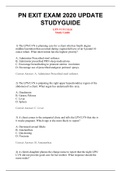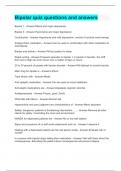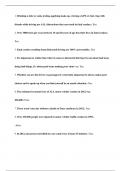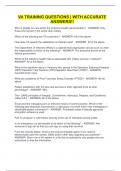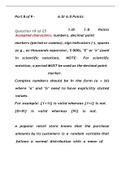Summaries - Readings Week 7
1. Newton & Van Deth: Foundations of Comparative Politics: Chapter 14 - Political ideologies Book chapter 2
2. Moffit: Liberal Illiberalism? (p. 112-122) Online article 6
, International Relations and International Organization Political Science
1. Newton & Van Deth: Foundations of Comparative Politics: Chapter 14 - Political ideologies
We organise ideas in a framework known as an ideology. An ideology is a more or less systematic,
well-developed and comprehensive set of ideas and beliefs about politics consisting of both
(empirical) statements about what is, and (prescriptive) statements about what ought to be.
- There are many different ideologies of which there are 4 prominent ones: conservatism, liberalism,
Christian democracy and socialism/social democracy. There are also three other systems of thought,
but their status as ideologies is disputed: green political thought, nationalism and populism.
The outline of the chapter looks as follows:
1. The nature of ideology
2. Four main democratic ideologies
3. Three other types of political thought
4. Theories of ideology
1. The nature of ideology
The term ‘ideology’ is used here in its social science sense, as a tool of analysis, not as a weapon in
the political struggle. Ideologies may be defined in terms of four main characteristics:
1. Complexity and abstraction: ideologies are relatively complex, abstract systems of beliefs.
2. Empirical explanation: ideologies pick out what they think is important from the mass of political
details and events and offer coherent explanations of what is happening and why.
3. Normative prescription: ideologies offer a vision of how political life could be and ought to be
4. Plan for action: ideologies spell out a set of beliefs about how political goals should be achieved
Some are suspicious of ideologies, claiming that they are closed systems of thought that are not
amenable to reason or disproof. Whatever argument is used to criticise a closed ideology of this kind,
and whatever evidence is used against it, is somehow treated as evidence to confirm it. According to
Popper, ideologies are to be distinguished clearly from scientific theories than can, in principle, be
tested and falsified against available evidence. Therefore, some (but not all) systems of thought can
be turned into closed and totalitarian systems of thought.
Some general points regarding ideologies are made:
- Ideology is not the same as political culture. Ideologies are more or less explicit, whereas much of
political culture is implicit and built on assumptions and values that are taken for granted. One is
socialised into and assimilates a (political) culture in the family, at school, while one learns an
ideology by thinking, arguing and reading in a more self-conscious way.
- Ideologies are an essentially contestable concept; there is often little agreement about what they
mean and what sort of actin they entail.
- Each major ideology has many variations within itself, and each different ideology has points in
common with rival ideologies - which makes it difficult to summarise them in a simple and clear way.
2. Four democratic ideologies
1. Conservatism: because it is pragmatic and flexible, some argue it is no ideology but a set of ideas
defending the status quo. However, conservatism is based on a systematic set of fundamental ideas.
- Social and political affairs: conservatism values an ‘organic society’ (preservation of status quo,
traditional institutions). Reform should be piecemeal, slow and cautious. It has a pessimistic view of
human nature (e.g. greed, selfishness, irrationality); therefore, a social hierarchy is needed.
Conservatism prefers a representative democracy: the masses are not naturally democratic and it is
dangerous to give them too much power. Lastly, they believe people are inherently unequal.
- Economic affairs: conservatism believes in the invisible hand of the market. The best way of
optimising the general interest is to allow each individual to act in her own economic interests;
therefore, state intervention should be minimized, because it will only result in inefficiency.
-> conservative thinkers are: Edmund Burke, Adam Smith, Joseph Schumpeter, Friedrich von Hayek
2



